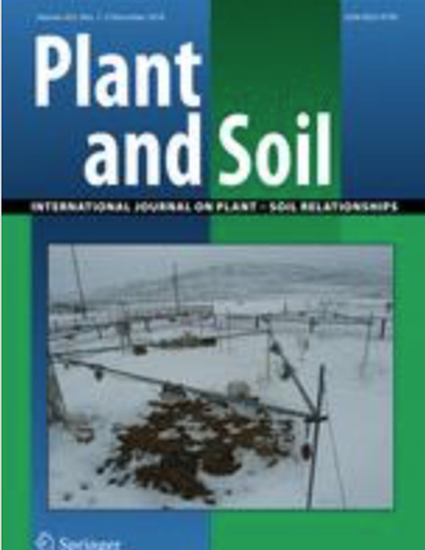
Article
Evaluation of elemental allelopathy in Acroptilon repens (L.) DC. (Russian Knapweed)
Plant and Soil
(2006)
Abstract
Although Acroptilon repens (L.) DC. (Russian knapweed) is known to concentrate zinc (Zn) in upper soil layers, the question of whether the elevated Zn has an allelopathic effect on restoration species has not been addressed. Experiments were conducted to investigate whether soils collected from within infestations of A. repens (high-Zn) inhibit the germination or growth and development of desirable restoration species, compared to soils collected adjacent to an A. repens infestation (low-Zn). Four bioassay species [Sporobolus airoides (Torrey) Torrey (alkali sacaton), Pseudoroegneria spicata (Pursh) A. Love (bluebunch wheatgrass), Psathyrostachys juncea (Fischer) Nevski (Russian wildrye) and A. repens] were germinated in a growth chamber and grown in a greenhouse in both soils and received treatments for the alleviation of Zn toxicity (P, Fe, Fe-oxide, and soil mixing) to isolate the effects of elevated soil Zn on plant performance. Percent germination, total plant biomass, tiller and stem number, inflorescence number, and tissue metal levels were compared among soil types and treatments for each species. There was no evidence from any of the indicators measured that high-Zn soils reduced plant performance, compared to low-Zn soils...
Keywords
- iron; phosphorus; plant interference; plant-soil feedback; restoration; weed invasion; zinc toxicity
Disciplines
Publication Date
November, 2006
DOI
https://doi.org/10.1007/s11104-006-9136-x
Citation Information
Christopher A. Call. "Evaluation of elemental allelopathy in Acroptilon repens (L.) DC. (Russian Knapweed)" Plant and Soil Vol. 289 Iss. 1-2 (2006) p. 279 - 288 Available at: http://works.bepress.com/christopher_call/9/
